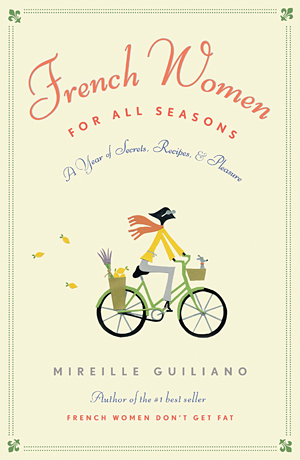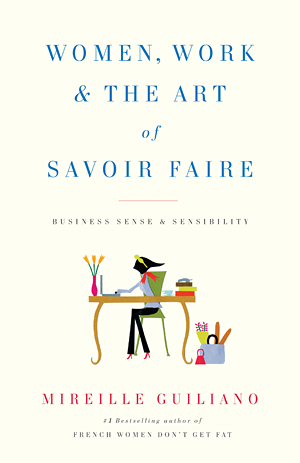Style Doyenne: Mireille Guiliano

We’ve been trying to keep up with the adventures of Mireille Guiliano, best selling author of two books, French Women Don’t Get Fat and French Women for All Seasons, two inspirational weight, health, and style books that are wonderfully written and have sold millions of hard copy texts. Only recently has French Women Don’t Get Fat gone into paperback, introducing millions more to her philosophy, which is essentially bien dans sa peau (living well with yourself, with your skin). A recent check showed that the paperback version appeared on a half dozen or more best selling lists, and the last time we looked it was #7 on the important New York Times list. Keeping up with petite femme isn’t easy, and she seems omnipresent, appearing on Bloomberg’s Night Talk, Fox News, Today Show (several times), the lecture circuit, radio shows, newspaper and magazine interviews. In addition, she works 12 to 18 hours a day. She’s found time to write for her online program (www.fwdgf.com); to pen the introduction to the “Gourmandes”/Appetite chapter in Les Parisiennes (it’s also a gorgeous photography text published by Flammarion); to write a few guest essays for Newsweek and for Nespresso (a magazine with two million circulation and published in several languages), as well as writing her quarterly “Wining and Dining” column with her husband Edward for this magazine. But this isn’t all. Guiliano is busy writing two more books, the first of which was started last year, and the titles of which are still under wraps. One is due for publication in November 2008, and the other for Spring 2009. Mireille Guiliano is a salvation not only to the millions who buy her books, but to the ailing publishing industry. Her books, moreover, have been published in dozens of different languages, making her more invaluable to her publisher, Knopf, which has to see Guiliano as an industry unto herself. www.mireilleguiliano.com
(Article reprinted from QRW Spring 2008.)

Book Review: French Women Don’t Get Bored
They enjoy life yet challenge themselves as they go, says Mireille Guiliano.
By now it is eminently clear to any one even remotely interested in health, weight, and lifestyle books that Mireille Guiliano is an industry. Yet she is more: she is a splendid writer, a literary person, a wordsmith whose prose is effortless. Her first book, French Women Don’t Get Fat seized the imaginations of readers as no such book has ever done, with millions of hard copy and paperbacks sold globally. Her website receives millions of hits, with even more hits on other sites generated on or about her. She has become the doyenne of the publishing world, and this month she gave her publisher, Alfred Knopf, an early holiday gift, French Women for All Seasons: A Year of Secrets, Recipes, and Pleasure ($25) — the best of stocking stuffers.
Guiliano is about to launch another television, media, and global travel tour of epic proportions. As with her first book, this one will take her to virtually every corner of the literate world, where her books have been translated into dozens of languages. All the major talk and radio shows, along with the press, are lining up for interviews. The effort is Herculean, and Guiliano performs her feats tirelessly and with grace. Amidst the glitter and financial fame, Guiliano has remained herself. Money hasn’t changed her, nor does it motivate her. She is still the woman who approaches each day hoping to make a difference. She starts her book, significantly enough, with a quotation from Thoreau, who mentions the need to make the most of everyday, of making the morning dew your diet drink, of taking control of your life, of making a difference.
French Women for All Seasons is more global in approach. Her first book was a tale of two cities: Paris and New York. She soon learned that Middle America — the world in fact — wanted her message, not just the well-heeled in two great urban sites. With the new book, Guiliano understands this. Further, the text is a practical and pleasing guide to putting some joie back into your vie. Like Thoreau, she would remind us “not to call our lives bad names,” but to live it as fully as one can. Her book is not about imaginary ideals of life, or another attempt of “life imitating art,” but about actual strategies for women who want to eat well and live well — life’s best revenge — through all the seasons, all the year, all the time. It’s about dozens of happy, easy recipes. (Invariably with Guiliano there will be leek recipes, which her readers crave — she has become the queen of leeks, of fresh vegetables, soups, potatoes, and all that’s good and flavorful.)
Part of living and eating well, says Guiliano, is entertaining, sharing, giving, and pairing good dinner guests for good conversation and laughter, something everyone needs to do more of. Start, she advises, with the great mood enhancer, a glass of Champagne, which for us cures all ills. Guiliano is not Martha Stewart; she’s not a personality, dabbling with the impossible in search of the unique. Rather, she’s a teacher, a motivator who understands that teaching is removing mystique, of challenging and cheering her readers. Says Guiliano, “a secret” to enjoying life is not to embrace a mindless hedonism, but “to cultivate a life of ongoing experimentation, exploration, and self-discovery.” Women do this by embracing the seasons, by savoring your life, by challenging yourself, by changing habits. For example, she asks in her first book, “do you really need to finish everything on your plate, or can you adopt the ’50 Percent Solution’,” by perhaps eating only half of what’s on your plate, and eating more slowly? Finishing everything on your plate is a concept generated over the centuries by hardworking, impoverished people, for whom every morsel of food was vital. This is hardly the case for 21st century readers of this book. We’re never too old to change our habits or our prejudices. French Women for All Seasons reinforces this.
Guiliano’s approach is soft-sell with style and charm. This is exactly how she created Veuve Clicquot marketing, making the Champagne — one that had no market 25 years ago — the best-selling one in the country. This is how the collection of stories and recipes in French Women for All Seasons is presented: they are designed to encourage, to motivate. Guiliano has firm opinions and high standards. Readers were eager to emulate many of them in her first book; they’ll find many more in this one. Her only agenda is to remind women about themselves, about being all they can be, about living in each season as it passes.
— Richard L. Elia
(Article reprinted from QRW Winter 2006/2007.)
Book Review: Required Reading
Mireille Guiliano’s latest book is a thoughtful manual for working women.

Mireille Guiliano, like Oprah, is one of the oracles these days, especially for women. And like Oprah, Mireille Guiliano has charm, along with a French accent that made all the difference in her success (as she admits). Her books have been sold in the millions, and the world knows French Women Don’t Get Fat. She readily offers advice on work and savoir faire (getting things done) to young professional women and to those emerging from undergraduate and graduate programs. The advice is needed. As one who has been involved with undergraduates for more decades than I care to recall, and as one who has been part of the wining and dining scene for just as long, young women — and men, of course — need it. Many of them come from backgrounds where the basics of common sense and manners and societal maneuvering have been ignored. It is not an accident that colleges across the country are offering a plethora of seminars on etiquette and on wining and dining. This book should be required reading.
Guiliano’s latest book, Women, Work, & the Art of Savoir Faire (Atria Books, $25) offers lots of common sense. The singular thing about common sense, however, is how uncommon it can be. The book is part guide, part narrative, part anecdote, and part inspirational. She excels at all four, and she is never better than when she becomes declarative. Thus, she offers the following advice.
“Know thyself.” This advice about self-awareness inscribed on the door of the oracle at Delphi is wise in the extreme. It’s not a question of just who you are, but what you are: what are your values, what is your future, where are you going ... ? The unexamined life is still not worth living. It’s not easy but it has to be done. “Don’t think failure.” And while you’re doing this, get yourself a “mentor, a coach, a piston” (someone with enough pull to open doors, give you contacts); everyone needs it. And don’t be afraid to take sensible risks, to travel down that road least traveled; it may make all the difference.
What many young would-be professionals don’t know, says Guiliano, is the importance of a thank you note. By hand and on a simple card, write (don’t email, Twitter, or text) a thank you note to anyone who has helped or interviewed you. And while you’re doing that, remember not to misspell anyone’s name, and remember to remember peoples’ names. At the interview, anticipate questions, rehearse your answers to these questions, look your interviewer in the eye, and give a good handshake and thanks on starting and ending. Show you’re eager to “learn,” to grow, “to work hard.” Once you get a job, remember that hard work and good fortune often go hand in hand. Success finds you, not the other way around.
At interviews, know about the company (she prefers larger corporations that have more to offer) for which you’re interested in working. Know and research the company, know the culture, the dress, (Guiliano is not a fan of casual Fridays). For that matter, know how to dress (she has a long list of do’s and don’ts in Chapter 5): wear a collar (a manifestation of “confidence” and surety), no “super mini skirts, not too much cleavage ... .”
Guiliano is even better when she insists on the importance of good communication skills. Whether you have a job or are looking for one, learn how to speak well (if you can’t, start practicing — we all had to). First impressions are everything. You need to speak well, to write well, to have poise. If you think you lack these, discover them. You need to reinvent yourself at times, “refresh your image.” One can’t start too soon. She also insists on the importance of a simple smile, of having good conversational and narrative skills, of respecting your audience. Take some of this advice and you’ll be bien dans sa peau (comfortable in your own skin). Her section on dining and entertaining is vital and worth the price of the book. When dining, remember to shut off your cell phone. If you must leave the table, remember your napkin goes on the chair, not on the table or your plate. Never be gauche, and never be noticed for the wrong things. You’re rarely given a second chance, especially in the professional world.
— Richard L. Elia
(Article reprinted from QRW Spring 2010.)
